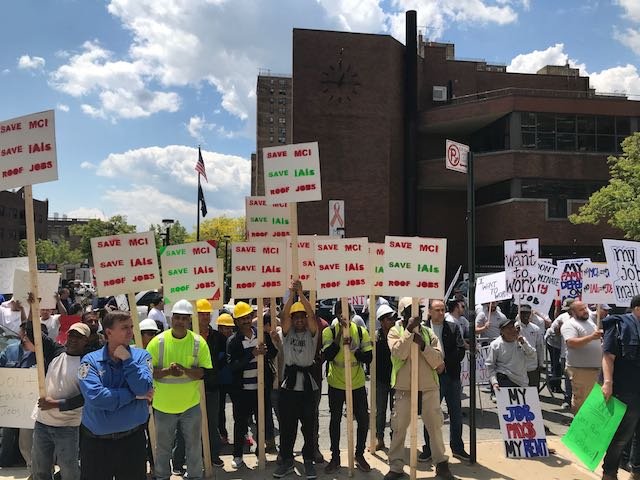'If These People Don't Pay, I Don't Work': Building Contractors Protest Rent Reform
May 17, 2019, 12:02 p.m.
The presence of the contractors suggested a new front in the opposition to rent reform, and, according to housing activists, are part of a concerted strategy by real estate interests.

Contractors protested a hearing on rent reform at Medgar Evers College in Brooklyn.
In a sign of an intensifying battle over rent reform, scores of contractors — electricians, plumbers, carpenters — faced off with housing activists on Thursday prior to a state Senate-sponsored hearing in Brooklyn on a package of legislation that seeks to tighten regulations for landlords and confer new protections on tenants.
The contractors, workmen who said they rely on jobs from residential landlords, chanted the phrase “save our jobs,” and at times exchanged angry words with a large crowd of tenant advocates who had gathered at the entrance of Medger Evers College in advance of a 1 p.m. hearing start. Many of them held signs and yelled out slogans that channeled a progressive message about jobs and the working class.
“Albany Don’t Destroy My Job,” read one sign. Several others said, “Save MCIs,” a reference to one of the provisions—Major Capital Improvements—that Democratic lawmakers are proposing to eliminate in one of nine bills. Currently, state rent laws permit building owners who spend money on building-wide improvements to pass along the costs to tenants through permanent rent increases. Housing activists say the policy has been widely abused by landlords to exact large rent hikes.
But landlord and real estate interests have argued MCIs encourage building owners to make needed investments and improvements, a line echoed by many of the protesters.
"If people aren't going to pay a small increase in rent, [landlords] are not going to renovate," said Rob Nicaj, an electrical contractor with Argon, a Long Island City-based firm. He and others said that tenants would then go without amenities like air conditioners and microwaves.
Another contractor, Brian, who declined to give his last name, said he worked for an Oil Company named Approved based in Bayridge, Brooklyn. “I showed up to fight for my job,” he said. Referring to the crowd of tenant advocates, “If these people don’t pay, I don’t work.”
Scores of contractors showed up to protest outside of today’s state hearing on rent reform. pic.twitter.com/oABJFbcX7F
— Elizabeth Kim (@lizkimtweets) May 16, 2019
The presence of the contractors, who had not been seen at prior hearings, suggested a new front in the opposition to rent reform, and, according to housing activists, are part of a concerted strategy by real estate interests. Three landlord groups — the Rent Stabilization Association, Community Housing Improvement Program, and Small Property Owners of New York — and the Real Estate Board of New York, the real estate industry’s broad-based lobbying group, have together mounted a campaign against many of the reforms through television ads and social media.
The groups did not immediately respond to messages left by Gothamist.
“It’s a sham,” said Cea Weaver, a campaign coordinator for the Upstate Downstate Housing Alliance. “They are claiming that rent control is anti-worker. It’s a false narrative.”
When asked, several of the contractors denied that the protest had been organized by a group or person, but had instead formed through a word-of-mouth effort. Some among them said they were part of unions, others said they were not.
Dominic Loccisano, who works with a Queens-based remodeling company called PCD, said he had learned about the protest through his boss and that he had seen some information about it on Twitter and Facebook.
“I’m here to support our cause,” Loccisano said. “I’m a working person. I don’t mind paying what I have to pay for.”
His boss declined to be interviewed.
Tensions flared as the two sides argued with another. At one point, housing activists singled out a man carrying a clipboard as the lead organizer. He could be seen walking away as Brooklyn Assembly member Diana Richardson began to question him while holding a phone camera toward his face.
Prior to today’s hearing on rent reform, a housing activist confronted a man at the protest waged by contractors. pic.twitter.com/WfbtRWXu0N
— Elizabeth Kim (@lizkimtweets) May 16, 2019
“She thinks I’m someone I’m not,” he later told Gothamist. He declined to give his name, but said he was a "community member" from Queens. He said he did not represent any group or real estate interest.
“I’m just a lifelong New Yorker who knows buildings have to be safe,” he added.
The packed hearing drew more than 150 people. Like the prior hearings, tenants and housing activists took their turn at the podium to speak about how rapid gentrification and speculative real estate interests had created an untenable situation for many New Yorkers.
Sarah Lazur, a lecturer at Barnard College, chronicled her experience of living in a neighborhood where she saw longtime tenants gradually become displaced through rent hikes and harassment. She said it ultimately motivated her to join the Crown Heights Tenants Union and lobby for reforms.
“I’m scared to be putting my decontrol story out there,” she said, noting that she herself was not a rent stabilized tenant and that her landlord could elect not to renew her lease at any time.
“I’m a good tenant, I pay my rent on time," she said. "It still might not be enough to stay in my home, in my community.”
The next public hearing on rent regulation reform will be on Wednesday, May 22, from 1:00-8:00 PM in Albany at the Legislative Office Building.